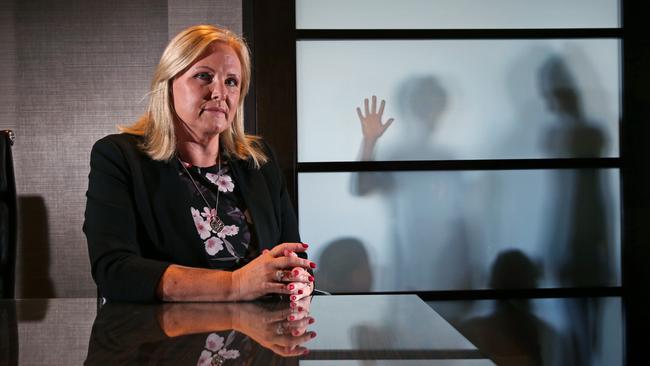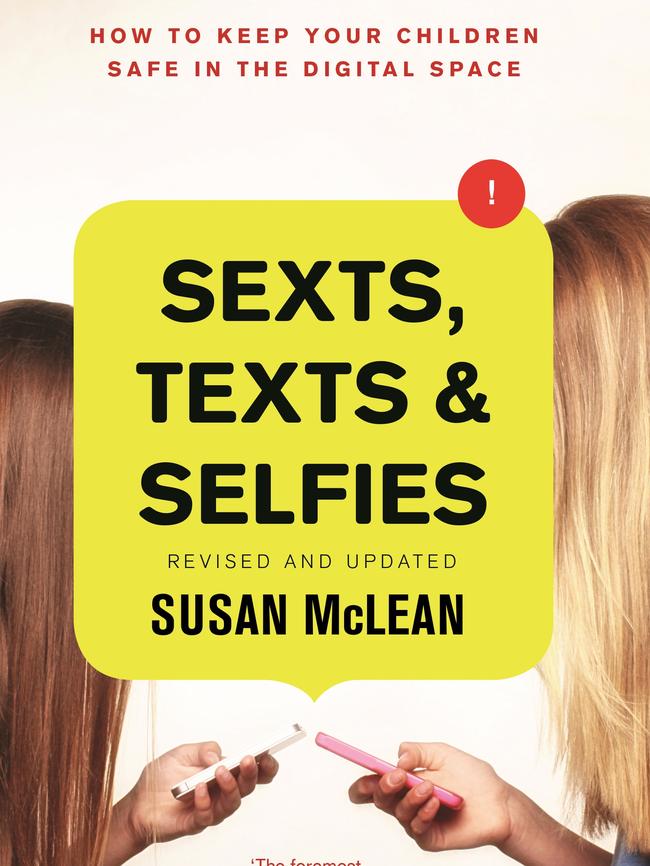The online world is becoming increasingly dangerous for children, a new book warns how
WITH children engaged across online platforms from ever younger ages, a new cyber safety book from a leading Aussie expert warns of the latest emerging traps.
VIC News
Don't miss out on the headlines from VIC News. Followed categories will be added to My News.
AS Victoria’s first policewoman appointed to a cyber safety role, Susan McLean has seen the worst of what the internet can offer children and young people.
Now an e-safety consultant, McLean spends her days visiting schools and community groups around the country, offering advice and education about emerging threats to kids and how to avoid them.
DISTURBING FIGURES REVEAL KIDS’ ONLINE USE
SHARING NO GOOD FOR CYBER SAFETY
Her 2014 book Sexts, Texts & Selfies has had to be largely rewritten and updated to keep up with new ways those preying on children are finding to make contact with them, and to take into account new security risks.
“Sextortion is a major issue we’re seeing where teens are victims,” McLean says.

“There are multiple ways it happens, but a typical one tends to be, ‘I’ve shared with you this photo because I like you’ and then him saying, ‘If you don’t keep sharing photos with me, I’m going to post the one I’ve got’.”
McLean says organised crime gangs that previously targeted adults for compromising photos are focusing on younger and younger victims.
“In the past two years, I’m seeing adolescent boys sucked into this,” she says.
“I had a Year 9 girl last year sextorted in that way.
“Criminals pretend to be their friends in a sexy, flirty chat, then once the sexy image has been sent it’s, ‘If you don’t pay $5000 by tomorrow morning I will put the photo online’.

“I’ve dealt with cases involving teenage boys from some of the most prestigious boys’ schools in Australia who have been sucked in.”
McLean says girls can be vulnerable if they are feeling low. She says the Year 9 girl mentioned above “came up to me at the end of a talk saying, ‘I was online feeling miserable, not feeling confident in my body, and he (the extortionist) was really nice to me, told me I was pretty and then I sent a photo and he demanded money’.
“All they want is opportunity; it is usually opportunistic, not someone you know betraying you.”
McLean says parents need to start conversations around electronic safety and cyber behaviour with children of younger ages than the parents of even five years ago did.
“It is sad, the conversations you have to have with your very young children, but you need to talk to a prep child, or a Grade 1 child about the fact they may be seeing porn on the net.
“The internet is not a children’s playground. People have to understand it’s not harmless fun. You wouldn’t dump them in the Bourke St Mall at 2am and hope for the best, but that’s what you’re doing if you give them unsupervised access.”
McLean says while she understands parents need to pick their battles with children, enforcing rules around unsupervised internet access is not one you can avoid.
“The fact is, seemingly well-adjusted, well-educated young people have got their names and images flashed across the internet forever (after being trapped into sharing intimate images),” she says.
She advises parents never to put a smartphone into the hands of a primary school child and, at best, try to avoid doing so even in the early years of secondary school.
“Kids don’t need smartphones; they want them, but you can still buy a dump phone with no camera and no internet — problem solved.”
She advises parents to remain constantly in touch with children using the internet about what they are seeing, and to use media articles on cyber safety or cyber disasters as a springboard to start the chat.
Her key advice, though, is that when children come to you with an issue they have encountered online, never threaten to remove their devices completely as this will only dissuade them from seeking your support again.
“They need to know they can trust you. Never, ever threaten to totally disconnect,” McLean says.
— Below is an extract from Sexts, Texts & Selfies, by Susan McLean, Penguin Life, RRP $29.99, out now
HOW DO THESE PEOPLE FIND YOUR CHILD?
ONLINE predators work on what I call the “burglar” concept. A person wanting to break in and steal from your house doesn’t usually want your house; they want any house that might have something of value in it to steal, and they will go down a street looking at each house to see which would be the easiest and quickest to break into.

They will bypass houses with good security, barking dogs, alarms and deadlocks, and just keep going until they hit the jackpot, so to speak. A house with no security, perhaps a window left open, and bingo — success.
The same thing applies online. Grooming of children either on or offline is a crime of opportunity.
Although police do a great job, they cannot arrest their way out of this problem. We must educate early to prevent the child becoming the “opportunity”.
Predators trawl the streets of cyberspace just looking for someone — anyone — to connect with so they can start the grooming process. Sites and accounts with high security will be overlooked for the child whose account is available to everyone online, or the account on an app or game that has little or no security, not a team of people behind the scenes trying to catch them out.
The child that immediately blocks a friend request from someone they don’t know, or does not engage with someone they don’t really know, will be overlooked for the child who doesn’t do these things.
Online predators are moving into apps as they know there are often limited security settings available and also that younger and younger children are using them — on phones, on the iPod Touch, and in bedrooms out of the sight of parents.
The fact that most children now have access to portable and easily hidden mobile devices means they are providing online predators with an ease of access that they have never experienced before.

Just as easily as an adult finds another adult online, predators find kids. They know the popular sites, such as: Kik, Instagram, Facebook, Snapchat, Skype, musical.ly, Minecraft, Roblox, Animal Jam, Clash of Clans, YouTube. They know the ones that have limited security settings, the ones that are app-based, and the ones younger kids use on tablets and iPods.
They also know the games kids play, and they play them too. They set up accounts on social networking sites and trawl until they find someone willing to chat.
Some of these sites and apps have relatively good safety settings and others don’t, but you cannot rely even on a good site to keep your child safe. It is up to the individual users and, for young children, parental supervision is vital.
Smart devices include built-in geolocation technologies that allow you to identify the physical location of the device.
This can give other people using the same applications as your child real-time access to their location. Quite simply, they can find out where you live.
You need to know which apps on your child’s device use location services, and how to disable them.
Follow these steps to turn off location services on an Apple device: (Go to) Settings, click Privacy, go to Location services (either turn it all off, or leave it on and turn off individual ones from the list of apps you use, such as the camera. On the newer operating systems, you are given three options: “always”, “while using” and “never”. If this is your device choose “never”).
For Android devices and other non-iOS systems, do the following: (Go to) Settings, click Location or something similar, depending on the device, switch Off (either turn it all off or turn it off for individual apps, such as the camera).
WHY DON’T KIDS LISTEN WHEN THE ALARM BELLS SOUND?
EVERYONE has instincts, a way of behaving, thinking or feeling that is not learned.
There are also early warning signs: specific physical indicators that alert us to possible risks to our safety. Examples can be a racing heart, getting the shakes or clammy hands, in fact anything that your body does to tell you that something is not right.
OUR MOST SPIED-UPON GENERATION
PARENTS WARNED OF CYBER PREDATORS
A young child’s instincts are developing along with their bodies, each child at a different rate. Young children simply do not have the confidence and maturity to trust their instincts and acknowledge the early warning signs, and remove themselves from a situation.
Even adolescents, who on reflection could identify the warning signs of impending danger, often do not have the ability to act on them and remove themselves from that danger.
WHERE TO GET HELP
If you are at all concerned about the possibility of your child being a victim of online grooming, please do the following:
REASSURE your child and ensure they are safe;
TRY to remain calm;
SAVE, print or take a screen shot of anything that could be evidence, including messages, posts and screen names;
LOG off;
DO NOT engage with the suspect;
DO NOT close your child’s account;
CONTACT your local police station for advice and assistance.
If you believe your child or another child is in immediate danger, phone 000 or your local law enforcement emergency phone number.
— Extract from Sexts, Texts & Selfies, by Susan McLean, Penguin Life, RRP $29.99, out now
READER OFFER
Buy Sexts, Texts & Selfies, by Susan McLean, for $27.95, including delivery.
Order online at heraldsun.com.au/shop or post a cheque/money order to: Herald Sun Shop,
PO 14730, Melbourne, VIC 3001


